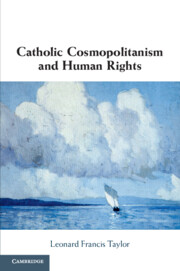Book contents
- Catholic Cosmopolitanism and Human Rights
- Catholic Cosmopolitanism and Human Rights
- Copyright page
- Dedication
- Contents
- Foreword
- Acknowledgements
- Introduction
- 1 Catholic Cosmopolitanism and the Birth of Human Rights
- 2 Catholic Cosmopolitanism from the Centre to the Periphery
- 3 Catholic Cosmopolitanism from the Periphery to International Concern
- 4 Locating a Modern Christian Cosmopolitanism
- 5 An Imperfect Cosmopolitan Project
- Conclusion
- Papal Documents Cited
- Select Bibliography
- Index
2 - Catholic Cosmopolitanism from the Centre to the Periphery
Published online by Cambridge University Press: 14 February 2020
- Catholic Cosmopolitanism and Human Rights
- Catholic Cosmopolitanism and Human Rights
- Copyright page
- Dedication
- Contents
- Foreword
- Acknowledgements
- Introduction
- 1 Catholic Cosmopolitanism and the Birth of Human Rights
- 2 Catholic Cosmopolitanism from the Centre to the Periphery
- 3 Catholic Cosmopolitanism from the Periphery to International Concern
- 4 Locating a Modern Christian Cosmopolitanism
- 5 An Imperfect Cosmopolitan Project
- Conclusion
- Papal Documents Cited
- Select Bibliography
- Index
Summary
Chapter 2 undertakes to provide a critical narrative of the development and direction of international law as it was characterised by Catholic preoccupations from the Medieval and Early Modern era. Chapter 2 surveys the theological and philosophical contribution to the structure of premodern international law by Augustine, Thomas Aquinas, Francisco de Vitoria and Robert Bellarmine. They assisted the Catholic Church at crucial moments in its history and left an enduring legacy, which could broadly be described as a foundation for a Catholic cosmopolitan approach to international law. This process is highlighted and contrasted with the way early-modern international law was constructed. The structure of international law that emerged during the eventful sixteenth and seventeenth centuries led to Catholic political and legal thought becoming a minor key in the development of a secularised public international law in the nineteenth century. This distinctively different approach to sovereignty and international order provides an opportunity to examine the peripheral place of religion, particularly Catholicism, in the structure of nineteenth-century international law.
Keywords
- Type
- Chapter
- Information
- Catholic Cosmopolitanism and Human Rights , pp. 68 - 120Publisher: Cambridge University PressPrint publication year: 2020

